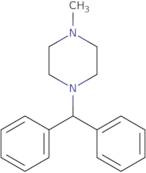Cyclizine Base
CAS: 82-92-8
Ref. 3D-FC31349
| 1g | Descontinuado | ||
| 50mg | Descontinuado | ||
| 100mg | Descontinuado | ||
| 250mg | Descontinuado | ||
| 500mg | Descontinuado |
Informação sobre produto
- 1-[Di(Phenyl)Methyl]-4-Methyl-Piperazine
- ( -)-1-Diphenylmethyl-4-methylpiperazine
- (N-Benzhydryl)(N'-methyl)diethylenediamine
- 1-Benzhydryl-4-methylpiperazin
- 1-Methyl-4-(α,α'-diphenylmethyl) piperazine
- Brn 0230441
- Bw 47-83
- Ciclizina
- Ciclizina [INN-Spanish]
- Compound 47-83
- Ver mais sinónimos
- Cyclizin
- Cyclizine [INN:BAN:DCF]
- Cyclizinum
- Cyclizinum [INN-Latin]
- Hsdb 3309
- Marezine
- N-Benzhydryl-N'-methylpiperazine
- N-Methyl-N'-benzhydrylpiperazine
- Nautazine
- Ne-Devomit
- Neo-devomit
- Nsc 26608
- Piperazine, 1-(diphenylmethyl)-4-methyl-
- Unii-Qrw9Fcr9P2
- Wellcome preparation 47-83
- Wellcome prepn 47-83
- 5-23-01-00232 (Beilstein Handbook Reference)
- Cyclizine
Cyclizine is a first-generation antihistamine with antipsychotic properties. It is used for the prevention and treatment of motion sickness, vertigo, nausea, vomiting, and postoperative or postpartum vomiting. Cyclizine has antioxidative properties that have been shown to have a protective effect against oxidative stress in the cerebellum. The drug also has antiviral activity against influenza A virus in vitro. Cyclizine has been shown to inhibit microbial growth by inhibiting protein synthesis at the ribosome level through competitive binding to bacterial ribosomes. This inhibits the uptake of amino acids into the ribosome, blocking protein synthesis and leading to cell death. Cyclizine binds to receptors on neutrophils, which induces an increase in intracellular cyclic adenosine monophosphate (cAMP) concentrations. Cyclizine also binds to pyridoxal phosphate-sensitive sites on tryptophan hydroxylase and serotonin N-acetyl





